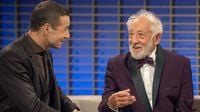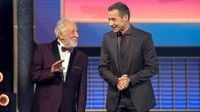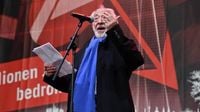In a controversial turn of events, renowned German actor and comedian Dieter Hallervorden sparked outrage during the ARD anniversary show "75 Jahre ARD" on April 5, 2025. His performance, which included a new version of his classic sketch "Im Kaufmannsladen," featured the use of racially charged language, igniting a fierce debate over the boundaries of comedy and political correctness.
Hallervorden, now 89, took to the stage alongside fellow performer Harald Effenberg to revisit his iconic "Palim, Palim" sketch. However, the new introduction set the tone for what would become a divisive moment in television history. As Hallervorden sat on a prison bed, he lamented, "Mann, Mann, Mann, du, Knast, du. Hätte ich gewusst, dass man das nicht mehr sagt," before uttering the terms "Negerkuss" and "Zigeunerschnitzel"—words that are widely regarded as racist in contemporary discourse.
The sketch, originally about two prisoners passing time by playing shop, suggested humorously that Hallervorden's character was imprisoned for using these outdated terms. What was particularly striking about this incident was that the show was pre-recorded, allowing the production team ample opportunity to edit out the controversial segment. Yet, the decision was made to air it unedited, leaving many viewers shocked and disappointed.
Following the broadcast, social media erupted with criticism. Users labeled Hallervorden's remarks as a "racist outburst," and many expressed their disbelief that such language could be aired on national television. One commenter wrote, "Ich bin erschüttert und schäme mich fremd," while another sarcastically noted, "Das N-Wort und das Z-Wort sind deutsches Kulturgut. Minderheiten wurden bei uns schon immer gern diskriminiert." The backlash was swift, with some users defending Hallervorden, arguing that he should not be censored for his comedic expression.
In a prior conversation with moderator Kai Pflaume, Hallervorden had positioned himself as a "sehr politischen Menschen," emphasizing that satire was a way for him to provide "politischen Nachhilfeunterricht" to his audience. However, many viewers found it difficult to reconcile this self-image with his choice of language during the sketch. Critics argued that the use of such terms was not only disrespectful but also indicative of a deeper insensitivity toward issues of race and representation.
Programmdirektorin Christine Strobl defended the show, stating, "Ein Abend, der Millionen berührte," without directly addressing the controversy surrounding Hallervorden's performance. This lack of acknowledgment from the ARD has further fueled the debate over the role of artistic freedom in comedy and whether it should extend to the use of racially insensitive language.
As discussions about cancel culture and the limits of free speech continue to evolve, Hallervorden's performance has become a focal point for those advocating for a more inclusive approach to language in the arts. Some argue that the backlash is part of a broader "woke" movement aimed at stifling creative expression, while others insist that accountability is essential in the fight against racism.
This is not the first time Hallervorden has faced accusations of insensitivity. In 2012, he was criticized for allowing a white actor to perform in blackface during a theater production. At that time, he vehemently denied the allegations, asserting that there was no place for racism in his worldview. His recent comments about political correctness and the challenges of navigating modern sensitivities suggest that he remains a polarizing figure in German entertainment.
As the dust settles from the anniversary show, it is clear that Hallervorden's words struck a nerve, raising questions about the responsibilities of artists and the impact of their choices. The incident serves as a reminder of the ongoing struggle to balance artistic expression with the need for cultural sensitivity.
In a media landscape that often grapples with issues of representation and inclusivity, Hallervorden's performance at the ARD anniversary show will likely be remembered as a pivotal moment, prompting discussions that extend far beyond the realm of comedy. As audiences reflect on the implications of his words, the broader conversation about race, language, and artistic freedom continues to unfold.










